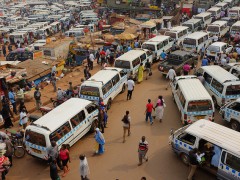Can Growth and Sustainability Be Achieved in Uganda At The Same Time?


The Central Bus Terminal in Kampala. Credit: Fred Inklaar (CC BY-NC-SA 2.0)
… is it possible for a country like Uganda to experience growth and sustainability at the same time?
Are we able to have a country and continent that delivers enough opportunity for its own people and provides a higher standard of living for everyone?
There are very pertinent questions that require some deep thought and reflection. Once again I engaged a number of my fellow youth in this conversation and the answers that emerged were amazing.
Opinion I
YES. However, we have a lot of work to do as Ugandans. We must redesign our economic system from its current pure capitalist form that rewards the rich with even more wealth to a blend of capitalism and socialism.
Wealth must be redistributed, the rich must pay higher taxes, the government must raise money to provide essential services, and our agricultural practices must allow land to rest fallow every now and then. We must reforest, conserve our wetlands and control exploitation of self replenishing resources.
We must provide a sensible minimum wage somewhere down the line and not heed the excuses given by our president about why we should wait and we should not allow technology to replace human labor – simply not allow it. Economies are about people and their livelihoods not about profits and efficiency as the ultimate goals.
Opinion II
Yes we can. When capitalism began taking root in the middle Ages in Europe, systems were designed to ensure that the rich only grew richer and the poor kept serving the rich in perpetuity. Academic curricula were designed to make people focus on having the right skills to get employment. Societies were restructured to reduce reliance on nature and become heavily dependent on industry.
Home grown skills were discarded in preference of so-called ‘industrial skills’. Economic theorists came up with ideologies which encouraged the overspecialization of human beings with pedestrian arguments about increased production.
Rural dwellers were convinced to abandon self-reliant mixed farming and lured into specialized types of agriculture thus trading food security for the promise of a few bucks from some industrialists who later sell you their products leaving you with a net balance of below zero (consider the wave of suicides among Indian farmers ).
Things like soap which we always got from wild leaves and plants were made a preserve of industrial production using environmentally unsafe chemicals to meet our basic needs.
We need to do three things.
First, we need to avoid wastage (it’s too much and unnecessary). Secondly we need to stop expecting technological miracles to change our lives when we are not treating nature the way it’s meant to be treated. And thirdly, we need to abandon this wholesale acceptance of capitalism and embrace a communally oriented approach towards managing our resources.
These opinions all say something about alleviating poverty, delivering more opportunity, and providing a higher standard of living to people who need it most. With a change of policy and by taking pride in our culture, it is possible to achieve growth.
Uganda has vast resources. With its mainly youthful population now is the time to tap into this rich demographic. Yet the country has also just discovered oil in the Albertine Graben and the spectacle of the government selfishly withholding knowledge about the oil contracts [which are supposed to be public documents] makes us all wonder if we are ever going to achieve this growth as we want to.
Taking pride in who we are as Africans and then having that trickle down into our policies as a nation is also very important. We can blame the colonialists about the state we are in now even 50 years after independence. But 50 years is a long time. We should have moved past that phase. But until we define who we are as Africans, we still have some work to do.
What is African about Africa, what do we take pride in as natives of this continent? What is Ugandan about our everyday lives that makes us want to belong and identify with this beautiful country?
Ngugi wa thiong’o the great African writer on a recent visit to Makerere University in Kampala, Uganda said:
“We can’t afford to become intellectual outsiders in our own land. We must connect with the buried alluvium of African memory and use it as a base for further planting of African memory on the continent and in the world. This can only result in the empowerment of African languages and cultures and make them pillars of a more self-confident Africa ready to engage the world”.
Technology does not offer solutions. It can only enhance the policies made. Technology is great, but It will not be able to solve the looming crisis with very low minimum wages or even the corruption that comes with managing our resources. And we need to stop looking at it as a miracle–worker of sorts.
It won’t transform the 78% youthful population of Uganda into a huge formidable workforce in a flash. It will not sort out the mess in our policies; it can only enhance what is on the ground for good or bad. No amount of sophistication will solve any of the growing number of maternal deaths in the country.
The fact that we are able to have this conversation shows that there is hope. But we need to find ourselves in the midst of all this globalization. Only then will we be able to grow sustainably.
Tags: Albertine Graben, environmental sustainability, growth, growth and development, Kampala, Rural dwellers, sustainability, Uganda, Urban
